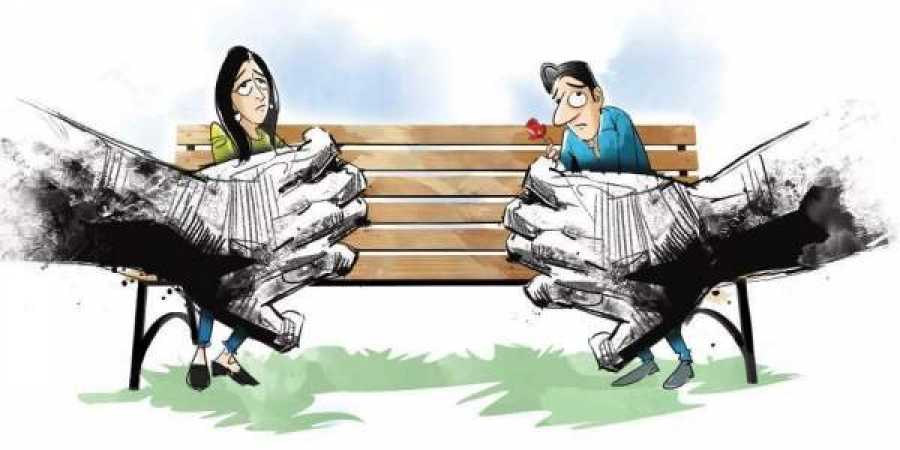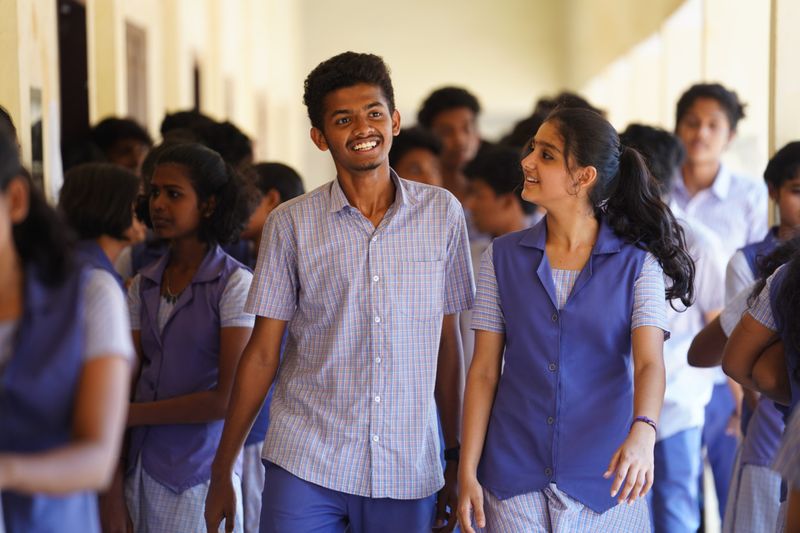Editor’s Note: This month, that is August 2020, FII’s #MoodOfTheMonth is Campus Experiences, where we invite various articles to highlight the diverse range of encounters we often confront when we are a part of any educational institution or space for learning be it schools, universities, colleges, tuitions and home. If you’d like to share your article, email us at pragya@feminisminindia.com.
First love has always been special, hasn’t it? The stories of them are often told with a wistful expression and sparkle in one’s eyes. The genre has been one I could never relate to. In my experience, the reality of these clandestine loves or relationships is far from this rose-tinted picture.
I completed my schooling 2 years ago from a Kendriya Vidyalaya in Kerala. In the deeply patriarchal society we live in, love has always been frowned upon. There are always subtle and not-so-subtle hints from society, media, and families about what is expected of us. Often dismissed as puppy love, teenagers are assumed to be dumb and vulnerable to the “consequences” of falling in love and are guarded closely from it.
My school had neat distinctions between the “good girls” and the “spoilt girls”. Even though a heterosexual relationship involves a boy too, rarely is he held accountable for any consequences. As was constantly reiterated by my teachers “ila vannu mullil veenalum, mull vannu ilayil veenalum, kedu ilakkanu” (It didn’t matter if the leaf fell on a thorn or the thorn on the leaf, the harm ultimately is for the leaf). The onus would inevitably fall on women.
My school had neat distinctions between the “good girls” and the “spoilt girls”. Even though a heterosexual relationship involves a boy too, rarely is he held accountable for any consequences. As was constantly reiterated by my teachers “ila vannu mullil veenalum, mull vannu ilayil veenalum, kedu ilakkanu” (It didn’t matter if the leaf fell on a thorn or the thorn on the leaf, the harm ultimately is for the leaf). The onus would inevitably fall on women.
Relationships in my school (and many other schools) were a scandalous affair. It took great courage to be in one. Keeping the relationship under wraps was even more of a risk. They were often protected as a Horcrux. But these things have a way of getting noticed, and sadly, getting “caught” for being in love was the greatest indignity to one’s reputation.

Once caught, there were a set of things that the child went through,
- You would get a round of scolding from your teacher (if you are unlucky enough you will get the extended disco version which questions you and your entire family’s character).
- Your parents would be informed. Some fortunate kids had empathetic parents who treated the situation appropriately. Others from more conservative backgrounds (cases were more for this one) would be subjected to constant taunts, emotional blackmail, and physical violence from the family.
- By the end of this charade, the whole school made it their business to alter and create different versions of the same story, convincing everyone that it was best suited that you walk around with the Scarlet Letter pinned to your uniform.
It is a well-established fact that schools are gender moulds. They are patriarchal institutions that play a prominent role in socialising children to fit into gender norms, according to the expectations of society. This is overtly visible from the way we wear our uniforms to the lessons we learn in school (remember Ranga’s marriage?). The casual gender policing done in schools often leaves deep scars. To handle a child of 15 or 16 in a manner that befits a criminal is atrocious. This treatment brought several consequences for the child.
Falling in love has never been a crime. Why is it treated like one?

Parents and teachers overlook the impacts of their actions on a child’s mental health. We have dismissed the notion of mental health in schools a bit too much. The effects of this are quite harrowing. Once labelled as “that girl”, your misery never stops—the moral ‘lectures’ from all the teachers, the routine visits to the counsellor (who kindly repeat the same lectures and never had any useful counselling to do), the blackmailing from the family, and the ostracisation by classmates. One’s reputation in school is now “tarnished” beyond repair making one the object of constant insult and humiliation.
Also read: A Note Of Empathy For The Vilified Female School Teachers
This kind of outcasting isn’t restricted to children who fall in love. Having a crush or being a child with a lot of friends from the opposite gender can still guarantee a place on this list. These girls are pronounced to be of questionable standards as they do not fit into the narrative of a woman that the world wants her to be. The slut-shaming that follows functions as an effective tool to crumble whatever soul one has left. Often in these cases, slut-shaming becomes a form of sanctioned symbolic violence by the teachers themselves who make it a point to constantly taunt the child in the class for they are now the example of what not to do in school.
Slut-shaming, moral policing, disguising love as a taboo are all patriarchal tactics that are used to teach girls their “position”. You teach a child that it is her responsibility to protect herself and not engage in close relationships with men for her safety. This fosters a culture that supports victim-blaming. It orders that women remain modest and exhibit no desires, a pressure exerted by society to conform to the conventional notions of femininity.
As teenagers, our self-worth is constantly tied to how others perceive us. When the whole world seems against the child because she transgressed an imaginary line drawn by society, the child resorts to self-blame (a reaction to the victim-blaming society does) and fosters self-hatred. Everyone around her convinces her that she was at fault and deserves to be punished and suffer the consequences. Hardly is a nice word said or a helping hand lent. A positive bystander intervention is unheard of.

The incidents of our childhood mark us in ways that are hard to recover from. These actions have drastic consequences on a child’s mental health. The moral policing done by the school and families, are dismissed claiming they have the good of the child in mind. This position reeks of paternalistic domination. The society sanctions this because it brings up children who neatly fit into gender roles.
Slut-shaming, moral policing, disguising love as a taboo are all patriarchal tactics that are used to teach girls their “position”. You teach a child that it is her responsibility to protect herself and not engage in close relationships with men for her safety. This fosters a culture that supports victim-blaming. It orders that women remain modest and exhibit no desires, a pressure exerted by society to conform to the conventional notions of femininity. Many of these are yet to change.
Schools are meant to be our second homes. Places of safety and creativity, responsible for raising us as intelligent and capable adults. The institution has failed us in so many ways. It has shied away from discussing what matters and maintained a paternalistic narrative that fits our society. The need to have conversations about important things like sex, consent, gender, and so much more is well felt. Teachers have to step in and participate as agents of change and not of patriarchy.
Also read: 9 Mind-Boggling Revelations About School Life We Hardly Thought About
Did I deserve to go through this crude and nauseating treatment?
No.
And neither did any of the women I know. Unfortunately, we were all victims of a patriarchal institution hell-bent upon categorising us into defined labels to fit their misogynistic narratives.
Sivakami is an undergraduate student at Tata Institute of Social Sciences, Tuljapur. She loves to study, collect quotes, and daydream. When not obsessing over issues related to gender and development, you can find her organizing life into a neat to-do list. She tries to skip over the major inconveniences of existence by diving into a good book and aspires to be as badass as Jo March. She wholeheartedly believes that reading will change the world one day. You can find her on LinkedIn and Twitter.
Featured Image Source: Gulf News





This essay resonates with all of us. You have initiated a discussion around the ordeal that comprises some of our worst memories of adolescence. It is a common experience, yet most of us can hardly talk about it. Our challenge is to keep challenging and resisting all that is legitimised in the name of patriarchy and tradition. The feminist revolution is not out there; it begins with each of us. Keep the flames burning!
I feel there is a change , a slow one ( as usual ) but there is …..
Its totally relatable. Its always considered YOUR fault. Even if you try to complain about some boy its you who have to be controlled. It might be you who is not wearing proper uniform or not sitting properly. And it can totally be you who might be making that boy to do things (sarcastically).
My comment may seem a little off topic but its also truth.
This is one of those topics which needs to be openly discussed. Beautifully written ?